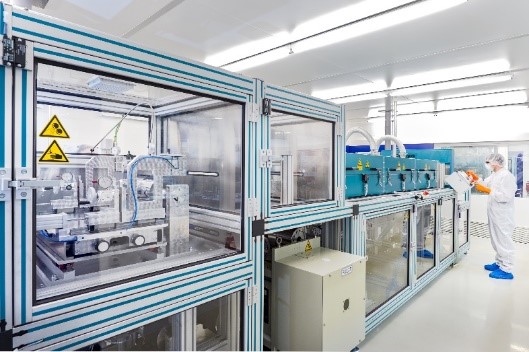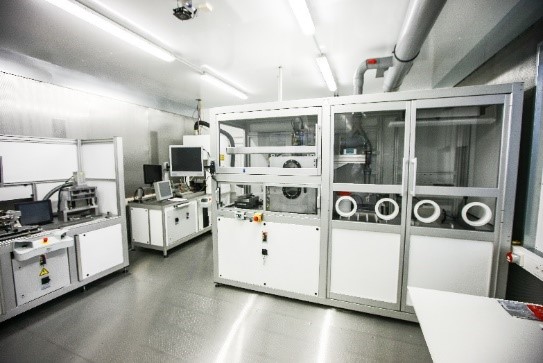
The Technical University of Munich (TUM) is one of the leading universities in Germany and Europe (Shanghai ranking: 54), has approximately 42.700 students, wherein more than one third are female and about 30% are foreign students.
Within the SPIDER project the Institute for Machine Tools and Industrial Management (iwb), which is part of the TUM, is participating. For more than 10 years, the research institute now works on lithium-ion battery topics, mainly related to cell manufacturing, cell design and manufacturing processes. The iwb is one of the largest research institutions of production technology in Germany, and encompasses two chairs at the Faculty of Mechanical Engineering in Garching near Munich. Both chairs, the Chair for Industrial Management and Assembly Technologies, as well as the Chair for Machine Tools and Manufacturing Technology, define the research content and the thematic focuses of the iwb. These lie in the areas of additive manufacturing, battery production, machine tools, assembly technologies and robotics, laser technology, sustainable production as well as in the field of production management and logistics.

Source: Andreas Heddergott / iwb
iwb at TUM
The iwb of the Technical University of Munich contributes to the SPIDER project with its expertise on battery research and production technologies. The complete representation of the battery production process chain from powdered active material to the finalized battery cell at one institute, in the form of the iwb pilot line, is unique in Germany.
Characteristics of the iwb pilot line are industry-oriented plant technology, flexible processes, and high safety standards. Due to the partially automated, adaptive plant technology, the iwb can produce coin, pouch, and hard case cells with capacities from a few mAh to over 30 Ah on one line.

Source: Andreas Heddergott / iwb
The research fields of electrode design and manufacturing as well as cell production and quality combine the competencies of production research on battery cells at the iwb. The main focus of the research of many years is the consideration of process chains, the improvement of process capability, the use of new components and equipment as well as the processing of innovative materials. The characterization of intermediate and end products based on defined quality features and data mining approaches ensures a high and constant quality of the final product and processes. In addition to conventional lithium-ion cells, the iwb also deals with solid-state batteries and other promising technologies.

Main contact: Benedikt Stumper, TUM
Benedikt Stumper graduated with a Master’s degree in Industrial Engineering and Management with a focus on Materials Engineering as well as Management and Sustainability in 2018. After his studies, he joined the Institute for Machine Tools and Industrial Management as a research associate in 2018. His main research activity focuses on the topic of prelithiation, where he works on direct contact prelithiation (mechanical prelithiation). In this context, he investigates the impact of prelithiation on cell performance and its implementation in the process chain of lithium-ion battery production. Besides he is active in the field of lithium-ion battery production, where he focuses on the processes of coating and calendering.
Why have you chosen to get involved as WP2 leader?
The work of WP2 includes the development and investigation of a suitable prelithiation process for lithium-ion batteries. For this purpose, different approaches are available, which imply different types of processes. The Institute for Machine Tools and Industrial Management, as one of the largest and leading institutes of production engineering in Germany, has extensive expertise in the field of process development and optimization. The iwb wants to bring this expertise into the project as a WP leader in order to enable a process-technical implementation of a suitable prelithiation method on laboratory and pilot scale and thus lay the basis for an industrial implementation.
What do you take out from this WP?
From this WP, the iwb takes knowledge and experience in the field of prelithiation. These provide the basis for further research and related projects. Through this, a new understanding of the process is also being built up at the iwb, about a process that is still relatively young and may be of great relevance in the future. Personally, these findings help me in my doctoral project and for my research. The prelithiation research provides deep insights into cell chemistry and the processes within a lithium-ion battery, which might have been less in focus before. Besides, working in an international research environment offers many opportunities to gain experience in battery research and international contacts. Working in such a large and multidisciplinary team is exciting and very educating. Thus, the work in the work package does not only result in technical knowledge in the field of new processes within the production of lithium-ion batteries, but also the management of international projects or working groups.
What are your expectations from the SPIDER project?
Mainly the above-described insight into new processes within lithium-ion battery production and a deeper understanding of the processes in a LIB. Besides, I hope that the research and the results of the SPIDER project will contribute to advancing battery technology and making LIB and its production more cost-efficient and environmentally friendly. Not only improved cell performance but also more cost-efficient, safer, and environmentally friendly processes and products are necessary for improved market penetration of electric vehicles. SPIDER will make its contribution to this at a European level and possibly beyond.
